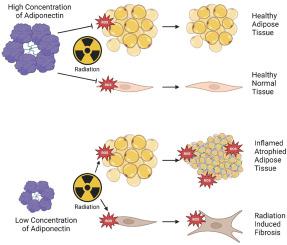当前位置:
X-MOL 学术
›
Redox Biol.
›
论文详情
Our official English website, www.x-mol.net, welcomes your feedback! (Note: you will need to create a separate account there.)
Exogenous APN protects normal tissues from radiation-induced oxidative damage and fibrosis in mice and prostate cancer patients with higher levels of APN have less radiation-induced toxicities
Redox Biology ( IF 10.7 ) Pub Date : 2024-05-31 , DOI: 10.1016/j.redox.2024.103219 Joshua A. McDowell , Elizabeth A. Kosmacek , Michael J. Baine , Oluwaseun Adebisi , Cheng Zheng , Madison M. Bierman , Molly S. Myers , Arpita Chatterjee , Kia T. Liermann-Wooldrik , Andrew Lim , Kristin A. Dickinson , Rebecca E. Oberley-Deegan
Redox Biology ( IF 10.7 ) Pub Date : 2024-05-31 , DOI: 10.1016/j.redox.2024.103219 Joshua A. McDowell , Elizabeth A. Kosmacek , Michael J. Baine , Oluwaseun Adebisi , Cheng Zheng , Madison M. Bierman , Molly S. Myers , Arpita Chatterjee , Kia T. Liermann-Wooldrik , Andrew Lim , Kristin A. Dickinson , Rebecca E. Oberley-Deegan

|
Radiation causes damage to normal tissues that leads to increased oxidative stress, inflammation, and fibrosis, highlighting the need for the selective radioprotection of healthy tissues without hindering radiotherapy effectiveness in cancer. This study shows that adiponectin, an adipokine secreted by adipocytes, protects normal tissues from radiation damage and . Specifically, adiponectin (APN) reduces chronic oxidative stress and fibrosis in irradiated mice. Importantly, APN also conferred no protection from radiation to prostate cancer cells. Adipose tissue is the primary source of circulating endogenous adiponectin. However, this study shows that adipose tissue is sensitive to radiation exposure exhibiting morphological changes and persistent oxidative damage. In addition, radiation results in a significant and chronic reduction in blood APN levels from adipose tissue in mice and human prostate cancer patients exposed to pelvic irradiation. APN levels negatively correlated with bowel toxicity and overall toxicities associated with radiotherapy in prostate cancer patients. Thus, protecting, or modulating APN signaling may improve outcomes for prostate cancer patients undergoing radiotherapy.
中文翻译:

外源性 APN 可保护小鼠正常组织免受辐射引起的氧化损伤和纤维化,且 APN 水平较高的前列腺癌患者的辐射引起的毒性较小
辐射会对正常组织造成损伤,导致氧化应激、炎症和纤维化增加,这凸显了对健康组织进行选择性辐射保护而不妨碍癌症放射治疗效果的必要性。这项研究表明,脂联素(一种由脂肪细胞分泌的脂肪因子)可以保护正常组织免受辐射损伤。具体来说,脂联素 (APN) 可减少受辐射小鼠的慢性氧化应激和纤维化。重要的是,APN 也不能为前列腺癌细胞提供免受辐射的保护。脂肪组织是循环内源性脂联素的主要来源。然而,这项研究表明,脂肪组织对辐射敏感,表现出形态变化和持续的氧化损伤。此外,辐射会导致暴露于盆腔辐射的小鼠和人类前列腺癌患者的脂肪组织中的血液 APN 水平显着且长期降低。 APN 水平与前列腺癌患者放疗相关的肠道毒性和总体毒性呈负相关。因此,保护或调节 APN 信号传导可能会改善接受放射治疗的前列腺癌患者的预后。
更新日期:2024-05-31
中文翻译:

外源性 APN 可保护小鼠正常组织免受辐射引起的氧化损伤和纤维化,且 APN 水平较高的前列腺癌患者的辐射引起的毒性较小
辐射会对正常组织造成损伤,导致氧化应激、炎症和纤维化增加,这凸显了对健康组织进行选择性辐射保护而不妨碍癌症放射治疗效果的必要性。这项研究表明,脂联素(一种由脂肪细胞分泌的脂肪因子)可以保护正常组织免受辐射损伤。具体来说,脂联素 (APN) 可减少受辐射小鼠的慢性氧化应激和纤维化。重要的是,APN 也不能为前列腺癌细胞提供免受辐射的保护。脂肪组织是循环内源性脂联素的主要来源。然而,这项研究表明,脂肪组织对辐射敏感,表现出形态变化和持续的氧化损伤。此外,辐射会导致暴露于盆腔辐射的小鼠和人类前列腺癌患者的脂肪组织中的血液 APN 水平显着且长期降低。 APN 水平与前列腺癌患者放疗相关的肠道毒性和总体毒性呈负相关。因此,保护或调节 APN 信号传导可能会改善接受放射治疗的前列腺癌患者的预后。











































 京公网安备 11010802027423号
京公网安备 11010802027423号